- Home
- Marge Piercy
Dance the Eagle to Sleep Page 9
Dance the Eagle to Sleep Read online
Page 9
Corey sat cross-legged on the cot, facing him. “Your life” He smiled broadly and held out his hands, palms up.
“And my money?”
“That, too, would help.”
Though Corey was dressed and he was in his briefs sweaty from the concert, he was not fazed. It took more than a little skin to make him uneasy. “Are you going to tell me I need you? You plural. Your wild Indians.”
“We’ll be stronger with you along. And you’d be stronger if you join us”
“I’m a rock musician. I’m no street fighter. I’d rather turn people on than harangue them.”
“Turn them on to what?”
“To themselves. To each other.”
“Where does that happen? Where’s a big neutral space for dropping out and digging each other?”
Shawn folded his arms. “Look, I’m sorry about last night. I have to be more careful not to lead people into traps. Maybe what I have to do is buy an old movie theater where people aren’t so vulnerable as in the park.”
Corey tapped his arm lightly. “Whatever do you think you can buy or rent or borrow that is outside this society? The only outside is the other side: with us fighting”
“You aren’t everybody. It isn’t a case of with you or alone”
“Do you know another collective that works for you?”
A collective of three: but the powers had broken that. “The group did. The Coming Thing.”
“And it came and went” Corey smiled engagingly. “Now you play with hired musicians, and it sounds it.”
“Yeah. I’m not working enough to keep a group together.”
“You’re blackballed now.”
Shawn shrugged. “That’s mainly the top-forty-type stations. That wasn’t our league after the beginning anyhow. That isn’t what I want to do right now.” Though he was beginning to sense that he had no idea at all what he wanted. He was flopping. “I don’t feel persecuted, if that’s what you mean. But Frodo and Shep and I were friends. Even then we’d fight. If you aren’t close, you start out fighting”
“We’re into something past all that. Past couples. Past the nuclear family that works so well as a hotbed for breeding neuroses. Past boy scout troops and clubs and teams and parties and unions. We’re a tribe.”
“Yeah, sure, McLuhan says we’re all tribal. I guess because we eat each other.”
“Look, you have a great talent to move people, but where are you moving them to? You don’t want to be a commodity. You want to give your music away free. But it turns out that nothing is free, on their terms. You can’t free people all alone with a turn-on like a magic wand. You’re not free yourself”.
“Maybe I am. You’re calling me to be a servant. Join another army. I didn’t like the first one”.
“Not free. Just alone. They’re still using you. The only way you can stop that is by fighting them. Break down the alienation they’ve imposed on you. Join us. Then they can persecute you, but they can’t use you any more.”
He believed nothing. But here he was. It was a place, anyhow. He was tired of ricocheting. The quality of his life had been crude and grainy and mean for a while. Since his discharge, he had been living out of hotel and motel rooms. The trouble was that he could not find any place he wanted to be. Nothing that had suited before fit now. He was not easy in the company of other musicians. He was a bad example, somebody who had fucked up his career, fucked up not even over drugs, which was traditional, but over an office manager. He could not get a group together and hold it together. The audience would scream for the old songs, but he felt wrong doing them. Without the sound of The Coming Thing, they felt botched. He wanted to sing the new songs that carried what he was thinking about. But they were strange to the audience. He had to do everything with his voice and his sex. He had to do it all on his performance.
It was not working. He did not like failing. Corey was sitting there waiting and waiting, afraid to push harder, afraid he had not spoken well enough. Shawn clasped his hands over the dirty cloth at his belly and thought: heads or tails. No tails. He could not go back anyplace he had been. They had closed his doors and taken away the landscapes where he had felt good. Heads. Indian heads. “There’s nothing to get but my instruments and my amps—what didn’t get destroyed in the riot. And a change of clothes and my straight-edge razor. Got to have my straight-edge razor.”
Corey waived the sodium pentothal test for Shawn. Billy showed his annoyance. He said Corey was highhanded and elitist and that such a decision must be made by the whole council. The council was called, and Corey won as Shawn waited upstairs. Corey charmed them into letting Shawn through. The test was to keep out infiltrators, Corey explained. One of their best warriors had turned out to be a police fink, and he had caused their first commune to be busted and those who escaped had had to leave Chicago. However, as if to prove to Corey that his position derived solely from the will of the group, the council refused to exempt Corey’s new girl, Joanna, and she had to take the test. Corey was furious and let it show. He disappeared and did not come back for a whole day and night.
Shawn saw Joanna for the first time that evening. He felt sorry for her, a lanky redheaded girl who seemed to wait stolidly, and yet he was sure she was afraid. He felt involved, because he was sure that if Corey had not pushed him through, she would not be obliged to take the test. Then Corey had run out on her, gone off to suffer his dark mood, abandoned her as if to show them they could not punish him through her.
When Shawn went over and took her hand, she gave him a shy smile. “I didn’t think you would remember me.”
“Why not?” Remember her. He did think that he had seen her, but god knew where. At the riot? No. Longer ago. Well, it did not matter and probably she would give him a clue.
She laughed brusquely. She had an odd voice, metallic and husky, that caught in her throat.
“Well, it’s been a year, and it was only those couple of days. I didn’t know who you were.”
“Sure you did. Just me. Right?”
She squeezed his hand and dropped it. “I really didn’t think you’d remember. By the way I’m … with Corey now.” She seemed at a loss for the right euphemism. She gave him another smile as shy as the first but warmer. Then she went out with two warriors to the test.
Corey turned up the next afternoon. He came directly to Joanna and grabbed her against him in a bear hug. “Are you all right? Come on. Come on” He led her away dragging by the hand without looking at anybody else. When he reappeared, he was in a sunny mood.
Most Indians spent their days and evenings out organizing among the kids. Even peddling the bread was a means of connecting people to the group. Basically there were four activities: organizing, defense and intelligence, activities that made for group solidarity, and food gathering and housekeeping.
The lowest level of involvement was contact—kids who looked to the Indians for leadership in street actions and protection in time of raids or dragnets. Then there were those who had taken bread, danced, and considered themselves part of the people. Then there were members of a tribe who had passed the truth test. Tribes lived in a commune and were not supposed to use money. The means of living belonged to the group, which fed and clothed its members.
What they called organizing was largely rapping with kids about their situation, helping them to articulate demands, helping them to get actions started or to protect themselves against street harassment, to recruit them if they could. They tried to reach the dropouts, the evaders and runaways on the Lower East Side, but they also talked to kids in school. They had contacts in eight high schools and one junior high, and they expected soon to have more. Most of the underground papers in the schools were at least sympathetic to the Indians. Some of the organizers were trying to reach kids in the various city corps, although that was riskier and more difficult. Every day they ran off wall newspapers for the neighborhood, and printed leaflets.
To be a member of the warriors, a militia composed of both
men and women, a kid had to prove his loyalty, his willingness to follow orders and his guts. He might be told to steal a piece of machinery, chemicals, a truck. Two boys were sent to penetrate Bellevue and bring out an Indian under observation there.
The task had to be one for which the need was clear. Assignments were made in council. The kid being tested could argue and invent options, but if he refused, he would never be a warrior. Why did the kids want to be warriors? Prestige. People needed such strange paste to stick them together. Some of these rituals struck him as silly as those of the summer camps of his childhood, but he kept his amusement to himself. Billy was the war chief: he had invented the warriors. He makes good machines, Shawn thought, with an edge of respectful distaste. He found Billy opaque.
That night, he sat in his first council. Everyone in the commune took part, and anyone could initiate business. People spoke one by one going around the sprawly circle. You could pass, but if you passed too often or someone thought you were holding back, he would chide you and urge you to speak out. The process was slow and Shawn found it tedious. Many were inarticulate and grappled painfully to get some half-formed idea out. Those who had strong opinions tended to soften them. “Well, I don’t know, but it seems to me … I think we could kick it around something like this …”
Side by side with that style was developing another—more militant, more “political,” with its own jargon. It seemed to come most naturally to the warriors. They were harder and fiercer in speaking their opinions, as if the jargon insulated them. They were always “fighting our bourgeois violence hang-ups,” “locating the cutting edge,” “exploiting the contradictions of imperialism.”
He passed the slow time examining the girls in the circle, trying to guess who they might belong to, looking for the bodies in the rough work clothes. That night for sure he wanted to get laid. As he sat cross-legged his prick was slightly swollen. He was coming back from the dead. Really it was a drag how they dressed. Fine for scrubbing the floor and hauling bags of potatoes, but it was a pig in a poke trying to read the body through the loose denim and khaki.
When the council finally ended, most of the Indians took bread. He was curious but not willing to take the risk that night. Suppose it cooled him off. Often when he was high, he wanted nothing but to listen to the patterns in his head. Then dancing began. He asked a blonde standing near to dance, and she stared at him. Then she laughed and told him he would first dance with everyone. She told him they always danced together after council, except in an action crisis. People were to dance for a better understanding of decisions. They were supposed to dance out any ruptures or quarrels. It was another way of being together, of expressing the tribe and each other.
“But suppose I want to express myself to you” He leaned close.
She would not flirt back. “Wait. Wait and see. Learn the language first” She skipped away into the big circle that had formed.
They played oil drums and paint cans and gongs and tambourines and a couple of guitars—neither in tune. It was raw. He would have to improve matters. Some kids shook rattles and clacked bells as they danced. Others squatted at the side rapt in making music. A short dark woman with an oil drum set the rhythm. Inside that rhythm the others improvised as they saw fit. The result was cacophony. Though sometimes they came together strangely into chance measures, mostly they hurt his ears.
He joined the slow shuffling outer circle. Sometimes people would do the same thing, pass along gestures or steps, sometimes they would just shuffle along doing a kind of grapevine. At times they would hold hands and at times they would jog or whirl along without touching. Most were concentrating on what was happening inside the circle, but some were indrawn and pulled into their muscles, and after a while he understood that they were preparing their dances. Soon they would step into the center.
A girl or boy would step from the circle and take off the rough work clothes and drop them. Sometimes he would stop to paint himself. Sometimes she would not. Some spent ten minutes slowly drawing designs on their bodies. Sometimes a couple would stop and painstakingly paint each other. Some people stopped only to draw a line or two or a symbol or to write a word across their chests. Some just threw off their clothes and started to dance.
Mostly, early in the dance, they danced alone. But often enough, couples danced. Sometimes boys danced with boys and girls with girls. Occasionally groups of three or four would form. Some of the dancing was passionate, some comic, some competitive and muscular, some consciously graceful or expressive, some overtly sexual. Two guys were teasing each other, mocking, leaping higher and higher and making fierce grimaces and chopping gestures—a danced-out samurai duel. A girl was spinning in trance, spinning, spinning till she fell and lay on the floor, and another girl squatted to take care of her and eventually to lead her to resume a place in the outer circle. Sometimes after they had danced, people would dress again, but often they did not—especially if they had painted their bodies with care. The music pounded on. Bodies expressed the music’s rhythms and their own.
The woman with the oil can was not bad. He watched her for a while. Strange-looking. Such a fat body and such thin arms. Like an insect. Then he realized she was pregnant. Yes, that explained the awkwardness as she leaned over her own belly toward the can. Pregnant. He did not know why that little fact kept tweaking at him. There were no children here, any more than in any other group of kids dancing. But if she was so pregnant and still in the group, they must mean to raise the baby. Maybe they really would be a tribe. But he must fight the Indians’ latent Puritanism, which made them play such crude instruments and restricted the decor to a couple of red and blue gels laid over two light bulbs. They had to understand that being ashamed of what’s beautiful was a conditioning as repressive as any of the other programming—economic and social—that they fought.
If a woman was dancing alone and a man wanted to dance with her, he would approach slowly. Shawn understood as he watched that if a dancer was in trance or vision or working out a pattern of her own, she did not want anyone to relate to her. So the guy might watch and then drop back and dance alone, or dance an invitation to someone else to join him. Equally, a woman would step out of the circle and approach with the same caution, waiting to see if she was accepted.
Some of the couples danced a flirtation, danced a display to each other. Sometimes their dance ended with their walking through the circle and climbing to the dormitory, where only a dim bulb burned or seeking some private corner. People noticed or did not notice. It was accepted. It was one way of ending the dance. One couple danced rubbing against each other, a slow rubbing of belly against belly, breasts against chest, a short hairy bearlike warrior with a bandage on his head and a girl with cropped brown hair slightly taller than he, with long muscular legs. In the dim light he was not sure, and then he was sure, that the warrior had entered her. They continued their slow dance interminably swaying and writhing, and the fucking was part of the dance. For a long time he watched them until they eased apart and returned to the circle.
He saw that the rough clothes and the nakedness were part of the way the group assimilated their sexuality. That what they were to turn on to in each other had its origin in the tension between the working self with its lack of allurement, the men and the women working together in the kitchens and the lab, fighting together in the streets, and the dancing body, naked and precisely sexual. The body itself gave out its message: I want, I am, see me. They were not objects. They did not use clothes to broadcast their sexuality. The body, the dance, did that. Shawn danced smiling and approved. People turning under the feeble, the ridiculous, the puny wattage of a couple of bulbs screened with one red and one blue gel, dancing to the half-witted bang and clatter of crude instruments awkwardly played, still were glorious. They were naked in a new sense, or a very old one. Long ago people had of course taken off their utilitarian furs and skins to dance. Dancing is the art of the body. It wants to be bare. Yes. He understood the strength
of dancing naked, and he was firmly convinced that they had never yet seen anything such as he would show them. Learn the language first, the girl had told him, but she did not know how quickly he began to speak in certain tongues.
Slowly he took off his clothes. He stepped over to the paints and considered. Then he dipped his fingers first in the blue and then in the red and painted a tangle of vines over his body. They would appear mainly black. He moved to the rhythm and found a song, one of his old songs that would lift on it. His voice could penetrate brick walls with amplification, but without it he could still fill a good-sized room.
Shady baby,
let the sun shine on your skin.
Baby, baby, warm you up again.
Gonna come back tomorrow
be sure you let me in.
Yeah, I’m coming back tomorrow
make sure that I get in.
The dark and very pregnant woman on the oil can had picked up on him already. Yes, she was with him. Good drummer. Get her a decent set of drums and watch her go. Yes, he would form a group out of nothing, if necessary, but she would be with him. Open the doors of your body, drummer lady, and let out the baby, ripe and squalling. He wanted a flesh and blood baby, smelly and insistent and ready to grow into a child that would be his too. For the rest, he just kept on above the general clang and crunch of the random instruments.
Throw open the doors of your body,
open the windows,
pull up all those blinds.
I am the sun baby,
I am the sun oh baby baby
watch me rise and shine.
I’m gonna warm you,
love you, love you
till you feel
oh yeah, till you feel so fine!
Two girls started at once in the circle. The first paused at the paints, looking at him, seeing him, and then began carefully to paint a sinuous design over her body. The second saw that and came directly to him, throwing off her clothes in a straggled heap. So even here, a little competition. Grinning he came to meet her.

 Woman on the Edge of Time
Woman on the Edge of Time The Cost of Lunch, Etc.: Short Stories
The Cost of Lunch, Etc.: Short Stories Made in Detroit: Poems
Made in Detroit: Poems Sleeping With Cats
Sleeping With Cats Moon Is Always Female
Moon Is Always Female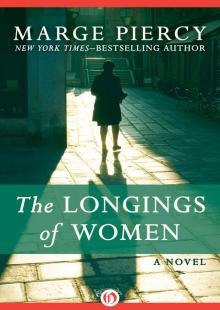 The Longings of Women
The Longings of Women Circles on the Water
Circles on the Water Summer People
Summer People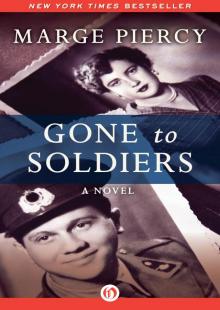 Gone to Soldiers: A Novel
Gone to Soldiers: A Novel The Hunger Moon: New and Selected Poems, 1980-2010
The Hunger Moon: New and Selected Poems, 1980-2010 Vida
Vida Fly Away Home
Fly Away Home He, She and It
He, She and It So You Want to Write
So You Want to Write Small Changes
Small Changes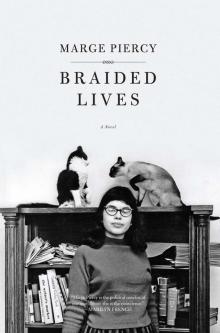 Braided Lives
Braided Lives Lord Valentine's Castle
Lord Valentine's Castle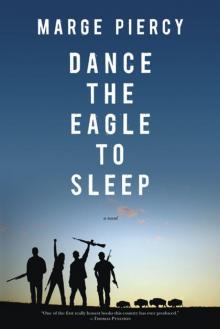 Dance the Eagle to Sleep
Dance the Eagle to Sleep City of Darkness, City of Light
City of Darkness, City of Light The High Cost of Living: A Novel
The High Cost of Living: A Novel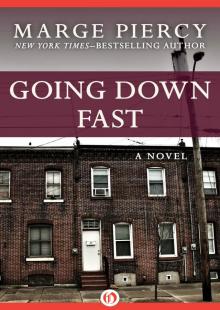 Going Down Fast: A Novel
Going Down Fast: A Novel My Mother's Body
My Mother's Body Storm Tide
Storm Tide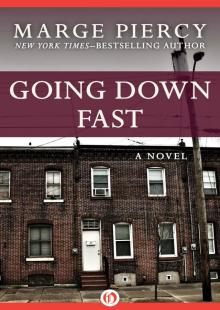 Going Down Fast
Going Down Fast The Third Child
The Third Child The Hunger Moon
The Hunger Moon The Cost of Lunch, Etc.
The Cost of Lunch, Etc. Sex Wars
Sex Wars The High Cost of Living
The High Cost of Living Made in Detroit
Made in Detroit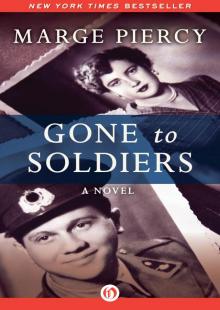 Gone to Soldiers
Gone to Soldiers